Martin Cosby's Blog, page 6
October 30, 2013
My top five favourite tales of terror for Hallowe'en
As it's Hallowe'en, I was thinking about scary stories. It made me think about exactly why I read, and what I look for in a tale.
It isn't specifically to be scared. I'm not the biggest fan of horror as such (despite an early exposure to the Pan horror collections) and I really don't wish to be confronted with any poor protagonist's bloody body parts; it's all a bit too messy for me. I think what I look for is atmosphere, specifically strangeness created from everyday circumstance. The moment a story withdraws into some kind of fantastical universe, where anything can happen with no apparent consequence, is the moment I tune out. I'm quite happy for odd things to happen, but only if there can be some ambiguity about it; did it really happen like that, or was my/the character's perception of the event unreliable? So as it turns out, in a lot of my favourite stories (the ones I frequently go back to), nothing very much frightening happens at all.
So I thought I might share with you some of the scariest stories I have enjoyed recently. That is, they go a little further than strangeness and into the realm of terror. For example, my feeling is that very few Aickman stories fit this bill. I love his work almost because it isn't scary in the conventional sense; he never had to resort to anything like shock tactics. However there are exceptions, and I recall a shiver down my spine when reading particular parts of some of his stories.
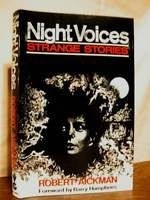
1. Laura by Robert Aickman
One of his more conventional (and shorter) stories, from his final collection, Night Voices, in which Andrew recalls the strange ongoing encounters he has experienced since meeting a girl at a party as a young man. The girl left him in the lurch, but promised "I shall always come back". He then fails to make contact with her for some years, until she turns up unexpectedly once more, looking no different. Again she leaves him frustrated, yet saying they will meet in the future. In the mean time, Andrew marries Cecilia, but realises that Laura is his enduring obsession; he may never be satisfied with his own reality: "I am not one of those men who can easily forget the date of his wedding." Years pass again, during which time he divorces Cecilia, and they lose touch. "I believe she's in New South Wales, but I see no reason why she shouldn't be all right."
His final encounter with Laura documented in this story provides the sting in the tail.
They meet at a convention in an hotel in the north of Italy. Andrew is compelled to follow her upstairs, into a dilapidated wing of the building, devoid of windows. "She opened a door to our left. I felt immediately that it might have been any door." When I read the description of that room for the first time, I really felt a chill go up my spine. "'Come in and have a drink with me,' bade Laura. 'Then I can look after you properly." I shudder to think; so should you.
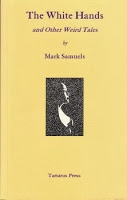
2. Mannequins in Aspects of Terror by Mark Samuels
This is from his collection The White Hands and Other Weird Tales. Speaking of chills going up my spine, this story succeeds only too well. This is a delightfully dark tale, set in a modern city landscape where terrible things exist alongside workers going about their everyday business. A junior architect develops an obsession with an apparently deserted office block visible from his office window. When an 'art installation' is opened in the building, by Eleazor Golmi, an architect he admires, he just has to go and experience it. What he discovers is more than unnerving, and a couple of sequences in this story are genuinely frightening even for the seasoned strange story reader; in particular what happens in the stairwell. "When I did hear footsteps climbing up from below, they sounded too awkward to belong to the next visitor." I have re-read this story a number of times, and I can see myself doing so again. Scarily essential reading.
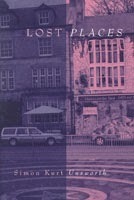
3. The Pennine Tower Restaurant by Simon Kurt Unsworth
This is from Lost Places, the author's excellent collection from 2010. This story is unusual because it is presented, very successfully, as a factual account. Simon is a writer who used to work for the council, and is asked by a previous colleague to investigate some strange and tragic happenings at the eponymous establishment. Unsworth sets out a thoroughly believable background and history for the building, then lists a large number of seemingly linked events, each becoming more bizarre and terrifying. There is a cumulative effect from these descriptions and accounts which thoroughly unnerves the reader, and as Simon's cynicism is overcome by gruesome evidence, the true horror of the situation is summed up in three words: "This is not fiction."
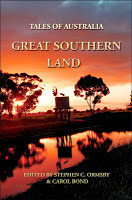
4. Disciple of the Torrent by Lee Battersby
The opening story from Satalyte Publishing's excellent anthology Great Southern Land, this tale was something of a surprise to me. It opens much like an historical tale of exploration on the high seas, then adds some devil worship, mutiny, storms and a shipwreck. Yet only then does the true horror begin. The unfortunate survivors are forced to try to live together on a group of desolate rocks off the coast of Australia. The ensuing cruelty, treachery and butchery combine with Cornelisz's delusions about resurrecting ancient gods to reclaim their earthly realm, and mayhem ensues. This is a strongly atmospheric tale, in which the sense of terror reaches a climax in the most dreadfully predictable of ways. Which doesn't make it any easier to bear!
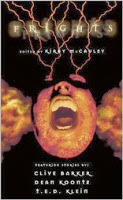
5. The Whisperer by Brian Lumley
More of a conventional horror story, this is one of those tales that has stuck with me for many years. Frights, edited by Kirby McCauley back in 1976, is an essential collection containing great work by writers such as Gahan Wilson, Robert Bloch, Ramsey Campbell and Russell Kirk. In The Whisperer, Miles Benton is alone in his railway carriage one morning when he is joined by "a little fellow – a very ugly little man" who sits opposite him; filthy and unkempt. To Benton's amazement, the figure whispers something to the ticket collector, who immediately ejects Benton from the carriage, saying it's suddenly "private". The following day, the ticket collector has no recollection of the strange figure or the event. Over the next few months, Benton is increasingly victimised by this creature, who is able to manipulate events with his hypnotic whispering. Eventually Benton becomes obsessed, then usurped; his wife leaves him, his life ruined, and his thoughts turn to violence and revenge. In his quest to hunt down his tormentor, Benton sees his wife with him; and, in a rage, he is knocked down by a taxi and badly injured. The horror of this tale comes when, just as the reader thinks things can get no worse, the whisperer takes away Benton's last desperate hope.
Happy Hallowe'en!
It isn't specifically to be scared. I'm not the biggest fan of horror as such (despite an early exposure to the Pan horror collections) and I really don't wish to be confronted with any poor protagonist's bloody body parts; it's all a bit too messy for me. I think what I look for is atmosphere, specifically strangeness created from everyday circumstance. The moment a story withdraws into some kind of fantastical universe, where anything can happen with no apparent consequence, is the moment I tune out. I'm quite happy for odd things to happen, but only if there can be some ambiguity about it; did it really happen like that, or was my/the character's perception of the event unreliable? So as it turns out, in a lot of my favourite stories (the ones I frequently go back to), nothing very much frightening happens at all.
So I thought I might share with you some of the scariest stories I have enjoyed recently. That is, they go a little further than strangeness and into the realm of terror. For example, my feeling is that very few Aickman stories fit this bill. I love his work almost because it isn't scary in the conventional sense; he never had to resort to anything like shock tactics. However there are exceptions, and I recall a shiver down my spine when reading particular parts of some of his stories.

1. Laura by Robert Aickman
One of his more conventional (and shorter) stories, from his final collection, Night Voices, in which Andrew recalls the strange ongoing encounters he has experienced since meeting a girl at a party as a young man. The girl left him in the lurch, but promised "I shall always come back". He then fails to make contact with her for some years, until she turns up unexpectedly once more, looking no different. Again she leaves him frustrated, yet saying they will meet in the future. In the mean time, Andrew marries Cecilia, but realises that Laura is his enduring obsession; he may never be satisfied with his own reality: "I am not one of those men who can easily forget the date of his wedding." Years pass again, during which time he divorces Cecilia, and they lose touch. "I believe she's in New South Wales, but I see no reason why she shouldn't be all right."
His final encounter with Laura documented in this story provides the sting in the tail.
They meet at a convention in an hotel in the north of Italy. Andrew is compelled to follow her upstairs, into a dilapidated wing of the building, devoid of windows. "She opened a door to our left. I felt immediately that it might have been any door." When I read the description of that room for the first time, I really felt a chill go up my spine. "'Come in and have a drink with me,' bade Laura. 'Then I can look after you properly." I shudder to think; so should you.

2. Mannequins in Aspects of Terror by Mark Samuels
This is from his collection The White Hands and Other Weird Tales. Speaking of chills going up my spine, this story succeeds only too well. This is a delightfully dark tale, set in a modern city landscape where terrible things exist alongside workers going about their everyday business. A junior architect develops an obsession with an apparently deserted office block visible from his office window. When an 'art installation' is opened in the building, by Eleazor Golmi, an architect he admires, he just has to go and experience it. What he discovers is more than unnerving, and a couple of sequences in this story are genuinely frightening even for the seasoned strange story reader; in particular what happens in the stairwell. "When I did hear footsteps climbing up from below, they sounded too awkward to belong to the next visitor." I have re-read this story a number of times, and I can see myself doing so again. Scarily essential reading.

3. The Pennine Tower Restaurant by Simon Kurt Unsworth
This is from Lost Places, the author's excellent collection from 2010. This story is unusual because it is presented, very successfully, as a factual account. Simon is a writer who used to work for the council, and is asked by a previous colleague to investigate some strange and tragic happenings at the eponymous establishment. Unsworth sets out a thoroughly believable background and history for the building, then lists a large number of seemingly linked events, each becoming more bizarre and terrifying. There is a cumulative effect from these descriptions and accounts which thoroughly unnerves the reader, and as Simon's cynicism is overcome by gruesome evidence, the true horror of the situation is summed up in three words: "This is not fiction."

4. Disciple of the Torrent by Lee Battersby
The opening story from Satalyte Publishing's excellent anthology Great Southern Land, this tale was something of a surprise to me. It opens much like an historical tale of exploration on the high seas, then adds some devil worship, mutiny, storms and a shipwreck. Yet only then does the true horror begin. The unfortunate survivors are forced to try to live together on a group of desolate rocks off the coast of Australia. The ensuing cruelty, treachery and butchery combine with Cornelisz's delusions about resurrecting ancient gods to reclaim their earthly realm, and mayhem ensues. This is a strongly atmospheric tale, in which the sense of terror reaches a climax in the most dreadfully predictable of ways. Which doesn't make it any easier to bear!

5. The Whisperer by Brian Lumley
More of a conventional horror story, this is one of those tales that has stuck with me for many years. Frights, edited by Kirby McCauley back in 1976, is an essential collection containing great work by writers such as Gahan Wilson, Robert Bloch, Ramsey Campbell and Russell Kirk. In The Whisperer, Miles Benton is alone in his railway carriage one morning when he is joined by "a little fellow – a very ugly little man" who sits opposite him; filthy and unkempt. To Benton's amazement, the figure whispers something to the ticket collector, who immediately ejects Benton from the carriage, saying it's suddenly "private". The following day, the ticket collector has no recollection of the strange figure or the event. Over the next few months, Benton is increasingly victimised by this creature, who is able to manipulate events with his hypnotic whispering. Eventually Benton becomes obsessed, then usurped; his wife leaves him, his life ruined, and his thoughts turn to violence and revenge. In his quest to hunt down his tormentor, Benton sees his wife with him; and, in a rage, he is knocked down by a taxi and badly injured. The horror of this tale comes when, just as the reader thinks things can get no worse, the whisperer takes away Benton's last desperate hope.
Happy Hallowe'en!
Published on October 30, 2013 16:15
October 8, 2013
Publisher for Dying Embers

I am more than pleased to announce that my first collection of short stories, Dying Embers, will be published by Satalyte Publishing.
The eagle-eyed among you will have noticed that I have removed the countdown clock from my website; this is because its release has been put back to early next year, to suit their schedule. I'm very, very happy – Satalyte is expanding rapidly, and has some excellent writers and plenty of great books coming up. I'm sure Dying Embers will have a great home there.
Published on October 08, 2013 01:32
October 4, 2013
Haunted houses: research for my new project
With Dying Embers now just about complete, I have been thinking about my next project, tentatively titled Terror Australis. Several of the tales in Dying Embers feature historic houses, or at least some form of local legend, myth or folklore, and I know a number of English short story collections featuring such historical links (such as Ghost Realm by Paul Finch); so why not one from an Australian perspective?
To this end I have been doing some research, and I've put together a few options. Last year I visited Cockatoo Island (see my blog here), and found this otherworldly place to be inspirational. More recently I visited Meroogal house in Nowra, which is a fascinating time capsule from the 1800s, and full of stories. Next on my list is Monte Cristo Homestead, in Junee, which is said to be 'Australia's most haunted house'. Dare I stay the night there? You bet! I'll let you know how it goes.
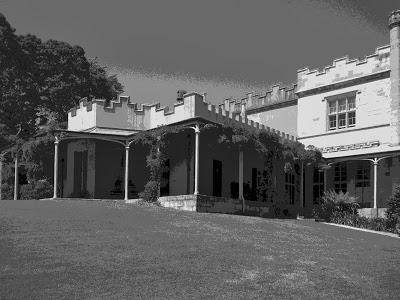 The main view of Vaucluse House from the gardens as you approach
The main view of Vaucluse House from the gardens as you approach
Anyway, for further research, today I visited Vaucluse House, in Sydney. It was home of William Charles Wentworth, father of the Australian Constitution, from 1827 until 1853; and I have discovered it contains many more fascinating tales from the past. I can't wait to get writing! I took some pictures for reference.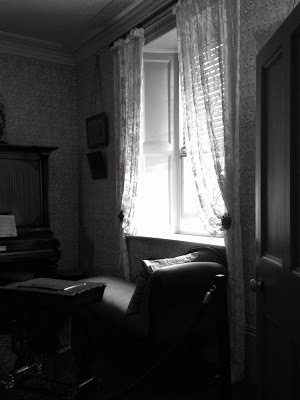 The 'games room' on the ground floor
The 'games room' on the ground floor
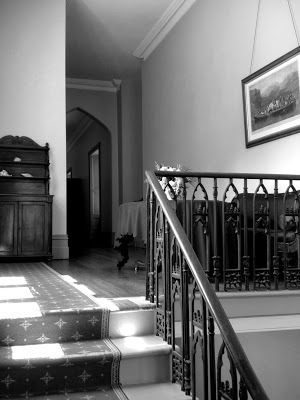 The upstairs landing
The upstairs landing
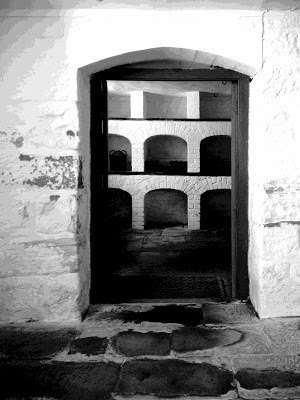 The cellars
The cellars
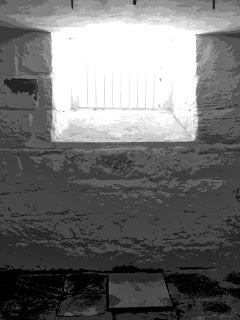 Barred windows in the coolerMy intention at this time is for Terror Australis to consist of around six dramatic 'strange adventures', written in a similar vein to Dying Embers, set in one of the feature locations. Each one would be followed by a non-fiction essay concerning the history, myth or legend surrounding the place.
Barred windows in the coolerMy intention at this time is for Terror Australis to consist of around six dramatic 'strange adventures', written in a similar vein to Dying Embers, set in one of the feature locations. Each one would be followed by a non-fiction essay concerning the history, myth or legend surrounding the place.
It could be one of a series, several volumes concerning different areas of Australia. From my researches so far, it seems there would be plenty of material for such a project.
What do you think?
To this end I have been doing some research, and I've put together a few options. Last year I visited Cockatoo Island (see my blog here), and found this otherworldly place to be inspirational. More recently I visited Meroogal house in Nowra, which is a fascinating time capsule from the 1800s, and full of stories. Next on my list is Monte Cristo Homestead, in Junee, which is said to be 'Australia's most haunted house'. Dare I stay the night there? You bet! I'll let you know how it goes.
 The main view of Vaucluse House from the gardens as you approach
The main view of Vaucluse House from the gardens as you approachAnyway, for further research, today I visited Vaucluse House, in Sydney. It was home of William Charles Wentworth, father of the Australian Constitution, from 1827 until 1853; and I have discovered it contains many more fascinating tales from the past. I can't wait to get writing! I took some pictures for reference.
 The 'games room' on the ground floor
The 'games room' on the ground floor
 The upstairs landing
The upstairs landing
 The cellars
The cellars
 Barred windows in the coolerMy intention at this time is for Terror Australis to consist of around six dramatic 'strange adventures', written in a similar vein to Dying Embers, set in one of the feature locations. Each one would be followed by a non-fiction essay concerning the history, myth or legend surrounding the place.
Barred windows in the coolerMy intention at this time is for Terror Australis to consist of around six dramatic 'strange adventures', written in a similar vein to Dying Embers, set in one of the feature locations. Each one would be followed by a non-fiction essay concerning the history, myth or legend surrounding the place. It could be one of a series, several volumes concerning different areas of Australia. From my researches so far, it seems there would be plenty of material for such a project.
What do you think?
Published on October 04, 2013 02:16
September 30, 2013
Review: Dark Spaces by Dionne Lister
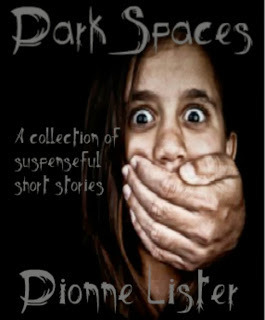
Dark Spaces by Dionne Lister is a collection of short stories and flash fiction. In the author's own words, they are 'stories of survival, fear, suspicion and emotion'. I am a particular fan of short stories of the darker kind, so I was looking forward to trying these out.
Breathe in Autumn is a strong start to proceedings, the clever title only becoming apparent in retrospect. Autumn is out for a run, and is concerned at recent reports of a stalker. When her fears become reality, the perspective changes and we see events unfold from the eyes of her attacker; but is there more to the situation than it would appear? Edge of the seat stuff, and the last line is great too.
Next up is An Awakening, an intriguing tale of love and forgiveness. Marian has a choice to make, and she is forced to come to terms with a relationship which has been at times difficult. A very human story, Dionne has the ability to encapsulate feelings and emotions, engaging the reader completely. An Outback Lament follows, a powerful piece of flash fiction worthy of any collection of Australiana. Capturing the harsh and unrelenting beauty of the country, I could almost hear the cicadas singing.
There's a different kind of beauty in Sarah's Story, that of survival and desperation. Sarah is struggling with a failed relationship and needy infant. However, the reader's sympathies change as the story unfolds, and we learn who the real victim is. By contrast, in The Presentation there is no doubt about the villain of the piece, and there is a real sense of satisfaction at the conclusion. Revenge is a dish best served cold!
Timmy's Escape is a modern-day fairy tale about failed relationships, and is all the more powerful for being brief. The sense of sorrow and regret is tangible, and leads the reader into the next tale Amy, which is perhaps the meatiest story here. Amy would seem to be the victim of abuse, and the product of a broken home; but who is responsible? Another edge of the seat story with a twisty ending.
Helen enjoys 'watching other people suffer', so as a nurse it might be said she is ideally placed. In Heart of an Angel we see what happens when the vulnerable Elizabeth arrives, and she is tempted to go too far; then is confronted with her own worst fears. The hunter becomes the hunted, and we are left to wonder how – or if – she will cope. The final story here is Climbing Everest, which tells Evelyn's story of estrangement, addiction and eventual reconciliation. The power of human relationships conquers all, despite everything.
These tales are insightful snapshots into human nature, taking a hard look at the decisions which have to be made, and their consequences. We see deeply into the minds of the characters, and as a result we care about their actions. I thoroughly enjoyed this collection, and it left me wanting more; I look forward to Dionne's next collection of short stories.
Published on September 30, 2013 18:10
September 22, 2013
Review: Impossible Spaces, by Hannah Kate
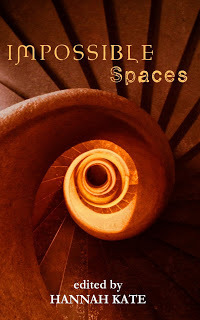 This collection, published by Hic Dragones, consists of twenty-one short stories themed around the idea of 'other worlds'. It is not, strictly speaking, a collection of supernatural tales, nor even so-called strange tales. More an eclectic mix from some excellent writers, some better known than others, giving their takes on the idea of a place that exists somewhere between the familiar and the unknown.
This collection, published by Hic Dragones, consists of twenty-one short stories themed around the idea of 'other worlds'. It is not, strictly speaking, a collection of supernatural tales, nor even so-called strange tales. More an eclectic mix from some excellent writers, some better known than others, giving their takes on the idea of a place that exists somewhere between the familiar and the unknown.Some of these impossible spaces are represented psychologically, some physically. Opening up proceedings is The Carrier, by Daisy Black, a bleak and claustrophobic tale involving both approaches. The protagonist tells her tale of being taken from her family as a child and leading a life of drudgery as a carrier; that is, being confined within a spiral staircase, taking objects up and down the steps, at the behest of a 'strange master' living at the top of the tower. The staircase becomes her whole world, the number of steps known to her by heart. That is until she starts to take an interest in the objects she carries. One day she is given an astrolabe to deliver, which becomes the precursor to greater knowledge and the expansion of the world within her mind. She begins to examine all the strange objects she carries, eventually obtaining a strange enlightenment, resulting in role reversal.
A different kind of space is involved in Mistfall, by Jeanette Greaves. Luke is killed in a car accident, leaving Georgia, his wife and his passenger, unscathed and with a sense of survivor's guilt. The fog which had concealed the jack-knifed lorry returns to her increasingly over the ensuing years, becoming a welcome world of its own into which she gratefully disappears, finding some kind of peace at last.
Rather less inviting is the nether-land at the crux of Nepenthes by Keris McDonald. This is a gritty and tense tale of Council cleaners assigned to Campbell House, a tower block in Howe Farm, a very rough housing estate. Brian is partnered with Alan, a more experienced operator, and they are subjected both to abuse by tenants and the filthy, thankless task of cleaning the place. The oppressive atmosphere is having its effect upon them by the time they reach the seventh floor, when they get to the end of a dark, forbidding corridor and smell something bad from behind the door of a flat. They call the police, and after a nerve-wracking wait, inexplicably they find a constable walking through the car park who helps them investigate. "Do policemen get lost?" Brian wonders. Nevertheless, they break in to the flat, finding flies and cockroaches but not much else. Until, that is, they check in the bedroom; a black place into which more than just light is sucked. This is a satisfying tale of urban squalor, and one of my favourites here.
Sharpened Senses has a fascinating premise, that of someone being able to see more than the usual number of colours, and therefore witnessing things that others do not. As such, Miss Ebisawa is a Tetrachromat, having to wear a blindfold to avoid seeing ghosts and monsters normally invisible; unable to function normally, she has checked herself into an asylum, and sits in a white room. She is studied with interest by the doctors, who believe her problems are psychological. The circumstances of her disappearance, however, provide more questions than answers.
I found Great Rates, Central Location by Hannah Kate to be most intriguing. A Sisyphian tale about the tribulations of Sarah, who has misguidedly booked a few nights in the very cheapest of the chain hotels in London, it conveys the sense of dislocation felt in such circumstances. This is worsened for her by waking up the next morning in a different hotel room; one without windows (this premise recalling Aickman's The Hospice of course). She also finds herself strangely transformed, and about to be captured by the hotel itself; by which time the price she paid no longer seemed like a bargain.
The Meat House by Maree Kimberley is a powerfully written and bold tale, but perhaps the most literal of the stories here, and a little too gory for my taste. By contrast, The Hostel is the closest to a conventional ghost story in the collection, investigating what seems like a parallel universe accessed from a tiny room in a hostel. Blurring reality with hallucination, with humour and a delightfully light touch, its message comes across clearly; everyone has their own unique reality.
I enjoyed the rest of these stories, particularly The Place of Revelation, Unfamiliar and Bruises, and no weak links are present. An eye-catching cover and good design and production by Hic Dragones (I have the kindle version) add up to an important collection that every fan of short stories, be they ghostly, strange or weird, should read.
Published on September 22, 2013 22:02
September 18, 2013
3 – a trio of short stories by Maria Savva
Maria Savva has released a great new collection of short stories, entitled 3... I have enjoyed her previous collections, and 3 is just as good. Details are below, and I will post a review soon. Meanwhile, get yourself a copy and enjoy.
Memories of the past can haunt the present
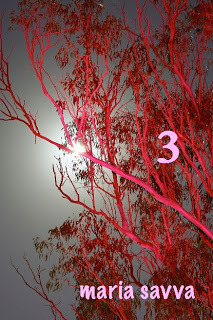
1. Never To Be Told – Tom and Amber are on a romantic date... but the past is always present.
2. The Bride – In this paranormal short, Olivia makes a chilling discovery.
3. What The Girl Heard – Victoria revisits a place that holds a dark reminder of an incident from her childhood. She had vowed she would never return.
Maria is a writer of short stories and novels. She has always been a storyteller, and an avid reader, and is now having a lot of fun in her adventure with the creative art of writing. She has published five novels, including a psychological thriller, a family saga, and a fantasy/paranormal/time travel book. She also has five collections of short stories, the latest 3 has been described as an “Innovative showcase” of her short stories. If you like stories that will take you deep inside the characters’ hearts and minds, and you like twists in the tale, you will probably want to try these stories.
As well as writing, Maria is a lawyer (not currently practising law). During her career, she worked in family law, criminal law, immigration, residential property law, and wills & probate, among other things. Many of her stories are inspired from her own experiences and the experiences of those she knows or has known. Chances are, if you get to know this author it won’t be long before you are changed forever into a fictional character and appear in one of her books. If she likes you, you may become a romantic hero/heroine; if she doesn’t... well, she writes a good thriller I hear.
Maria currently divides her time between working as an administrator in a university, and writing/reading/editing/blogging. She maintains the BestsellerBound Recommends blog helping to promote fellow indie authors. She’s also a music blogger for UK Arts Directory where she helps promote independent musicians.
Connect:
Official website: http:www.mariasavva.com
Goodreads Blog: http://www.goodreads.com/author/show/1418272.Maria_Savva/blog BestsellerBound Recommends: http://quietfurybooks.com/bestsellerboundrecommends/
UK Arts Directory Blog: http://ukartsdirectory.com/category/blog/maria-savva/
Twitter: http://Twitter.com/Maria_Savva
Facebook: https://www.facebook.com/pages/Author-Maria-Savva/171466979781
Buy links:
3 is Currently available in Kindle format (Can be read on a Mac, PC, iPad, Smartphone etc., with the free downloadable apps from Amazon). Look out for the paperback coming soon.
Amazon US: http://www.amazon.com/3-ebook/dp/B00EUM59XM/
Amazon UK: http://www.amazon.co.uk/3-ebook/dp/B00EUM59XM/
Amazon FR: http://www.amazon.fr/3-ebook/dp/B00EUM59XM/
Amazon ES: http://www.amazon.es/3-ebook/dp/B00EUM59XM/
Amazon CA: http://www.amazon.ca/3-ebook/dp/B00EUM59XM/
Amazon BR: http://www.amazon.com.br/3-ebook/dp/B00EUM59XM/
Amazon IT: http://www.amazon.it/3-ebook/dp/B00EUM59XM/
Amazon JP: http://www.amazon.co.jp/3-ebook/dp/B00EUM59XM/
Book Trailer:
Memories of the past can haunt the present

1. Never To Be Told – Tom and Amber are on a romantic date... but the past is always present.
2. The Bride – In this paranormal short, Olivia makes a chilling discovery.
3. What The Girl Heard – Victoria revisits a place that holds a dark reminder of an incident from her childhood. She had vowed she would never return.
Maria is a writer of short stories and novels. She has always been a storyteller, and an avid reader, and is now having a lot of fun in her adventure with the creative art of writing. She has published five novels, including a psychological thriller, a family saga, and a fantasy/paranormal/time travel book. She also has five collections of short stories, the latest 3 has been described as an “Innovative showcase” of her short stories. If you like stories that will take you deep inside the characters’ hearts and minds, and you like twists in the tale, you will probably want to try these stories.
As well as writing, Maria is a lawyer (not currently practising law). During her career, she worked in family law, criminal law, immigration, residential property law, and wills & probate, among other things. Many of her stories are inspired from her own experiences and the experiences of those she knows or has known. Chances are, if you get to know this author it won’t be long before you are changed forever into a fictional character and appear in one of her books. If she likes you, you may become a romantic hero/heroine; if she doesn’t... well, she writes a good thriller I hear.
Maria currently divides her time between working as an administrator in a university, and writing/reading/editing/blogging. She maintains the BestsellerBound Recommends blog helping to promote fellow indie authors. She’s also a music blogger for UK Arts Directory where she helps promote independent musicians.
Connect:
Official website: http:www.mariasavva.com
Goodreads Blog: http://www.goodreads.com/author/show/1418272.Maria_Savva/blog BestsellerBound Recommends: http://quietfurybooks.com/bestsellerboundrecommends/
UK Arts Directory Blog: http://ukartsdirectory.com/category/blog/maria-savva/
Twitter: http://Twitter.com/Maria_Savva
Facebook: https://www.facebook.com/pages/Author-Maria-Savva/171466979781
Buy links:
3 is Currently available in Kindle format (Can be read on a Mac, PC, iPad, Smartphone etc., with the free downloadable apps from Amazon). Look out for the paperback coming soon.
Amazon US: http://www.amazon.com/3-ebook/dp/B00EUM59XM/
Amazon UK: http://www.amazon.co.uk/3-ebook/dp/B00EUM59XM/
Amazon FR: http://www.amazon.fr/3-ebook/dp/B00EUM59XM/
Amazon ES: http://www.amazon.es/3-ebook/dp/B00EUM59XM/
Amazon CA: http://www.amazon.ca/3-ebook/dp/B00EUM59XM/
Amazon BR: http://www.amazon.com.br/3-ebook/dp/B00EUM59XM/
Amazon IT: http://www.amazon.it/3-ebook/dp/B00EUM59XM/
Amazon JP: http://www.amazon.co.jp/3-ebook/dp/B00EUM59XM/
Book Trailer:
Published on September 18, 2013 04:49
September 15, 2013
Guest post Q&A; Maria Savva
Today the guest post on my blog is by that excellent writer Maria Savva. I have read her short story collections Love and Loyalty, which I reviewed here, and Delusion and Dreams, reviewed here. Both were fascinating, thought-provoking and varied collections, delving beyond the obvious in everyday lives, and I thoroughly enjoyed them.
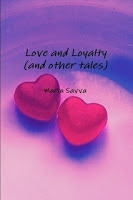 By the way, Maria has just published her latest collection of short stories, entitled
3
. I will post more details and a review soon.
By the way, Maria has just published her latest collection of short stories, entitled
3
. I will post more details and a review soon.
She was kind enough to answer these questions for us; take it away, Maria!
P { margin-bottom: 0.21cm; }
P { margin-bottom: 0.21cm; }
What has been the most influential short story you've read?
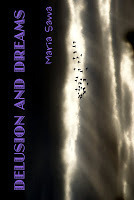 It’s more of a novella, really, but it’s Paulo Coelho’s The Alchemist. That book really made me want to write one of my own. I can’t recall any influential short stories, only because up until a few years ago I was never much of a short story reader; it was always novels for me. More recently, I have discovered that there are some wonderfully talented short story writers out there.
It’s more of a novella, really, but it’s Paulo Coelho’s The Alchemist. That book really made me want to write one of my own. I can’t recall any influential short stories, only because up until a few years ago I was never much of a short story reader; it was always novels for me. More recently, I have discovered that there are some wonderfully talented short story writers out there.
What is the most interesting character from a short story you can recall off-hand?
Again, more of a novella. The main character in The Metamorphosis by Franz Kafka. Totally fascinating.
Why do you write short stories?
Initially, I used to write short stories for competitions. In my twenties, when I was determined that I would write the next bestselling novel, I was browsing some writing magazines and came across Writers’ News (I’m still a subscriber to that magazine, many years later!). The magazine has a short story contest and I fancied myself as a bit of a writer at the time, so I thought I would enter. I went on to enter quite a lot of short story contests for many years. I had many short-listed stories, and I even won a prize of £150 once, for the short story The Game of Life, which now appears at the end of my collection, Delusion and Dreams.
Nowadays, I write short stories because I love them, and I can write one in about an hour. It’s fun how the creative process works. I never know how my stories will end when I start writing them, which makes it even more fun. Writing short stories fits in well with my life at the moment because I have a full-time day job. I’ve mainly written my novels when I’ve been out of work, or working part-time. It’s very time-consuming to write a novel. I started writing my sixth one last December and got to about 15,000 words when I had to abandon it because work became busy and real life took over. I really want to get back to that, but for now, realistically, I’ll probably be concentrating more on short story writing for the foreseeable future.
Another reason I like writing short stories is that they help to develop writing skills. You have to be able to write something, explain something, using fewer words, and this is a skill you learn when you write a lot of them. You also learn how to play around with words more, because there are fewer words and you get more of an urge to add depth to the story more succinctly, so you find yourself coming up with fancy sentences that sound nice and use words that are maybe new to you (Well I do that anyway!).
Why did you start writing?
Probably because of my love of reading. I have always been an avid reader. I was the typical bookworm as a child. The natural development was to want to try to do what my writing heroes/heroines were doing, I suppose. I’ve always had a very wild imagination as well, so this is one way to do something useful with it.
To what degree are your stories autobiographical?
All of them, to some extent, contain bits of me and my life. I think it’s natural for a writer to be inspired by his/her own world. That’s what makes fiction so interesting: it’s other people’s take on reality, an insight into their soul almost. Sometimes my stories only contain a hint or whisper of my own experiences, and other times they are a veiled reality dressed up as fiction. Some, of course, are completely made up :)
Do you like scary stories?
I like writing them, apparently. I kind of scared myself when I was writing Haunted, and again when I wrote The Bride (which is one of the short stories in 3). I’ve always had an interest in ghost stories because I have had a few paranormal encounters. I used to live in a haunted house. I was a child then (between the ages of about 5-9). At that time I enjoyed telling ghost stories to my friends. I even invented, in collaboration with one of my best friends at the time, a fictional ghost who lived in our school—or, more accurately, a family of ghosts. Me and my friend would tell the other children all about these ghosts and how we had seen them (which we hadn’t, of course), but it got to the stage where many of the children believed our tales and me and my friend had to explain ourselves to one of the teachers.
What is the most frightening thing you have read?
There was a really scary bit in Hauntedby James Herbert. I’ve forgotten what it was except that it was something to do with ghosts. I doubt I would ever be brave enough to read it again, so I guess we’ll never know LOL. I’ve been through just about every reading ‘phase’ you can go through, and when I was younger, horror/thrillers were included. I kind of grew up watching horror films. I don’t think there were the kind of ratings restrictions in the 1970s as there are now for films. As a child I watched some really scary horror films. It’s funny because back then I wasn’t fazed by them. Now I am too frightened to watch them (and I don’t read horror anymore for the same reason!).
Who is your favourite writer?
I have too many to mention. There are so many talented writers out there.
How different would your writing career be without social media?
I would get more writing done!
How many books would you read in a year?
It varies depending on whether I am involved in other projects. For example, when I’m writing my own stuff or editing, it leaves me with less time to read. I read a lot of books, but go through slumps when I can only maybe read a couple in a month. I am more attracted to shorter works nowadays because I have less spare time. I’ve been reading lots of great short stories. Including your ones, Martin, which I’ve really enjoyed. I think I’ve read about 30-40 books this year so far.
At what stage of your writing career would you 'give up your day job' (or would you)?
I would definitely, because I find myself staying up into the night just so I can finish writing projects. I would like to be able to get to the stage where I can write for a living. If I was earning a living wage from my writing, I would choose writing over any other ‘career’.
 By the way, Maria has just published her latest collection of short stories, entitled
3
. I will post more details and a review soon.
By the way, Maria has just published her latest collection of short stories, entitled
3
. I will post more details and a review soon. She was kind enough to answer these questions for us; take it away, Maria!
P { margin-bottom: 0.21cm; }
P { margin-bottom: 0.21cm; }
What has been the most influential short story you've read?
 It’s more of a novella, really, but it’s Paulo Coelho’s The Alchemist. That book really made me want to write one of my own. I can’t recall any influential short stories, only because up until a few years ago I was never much of a short story reader; it was always novels for me. More recently, I have discovered that there are some wonderfully talented short story writers out there.
It’s more of a novella, really, but it’s Paulo Coelho’s The Alchemist. That book really made me want to write one of my own. I can’t recall any influential short stories, only because up until a few years ago I was never much of a short story reader; it was always novels for me. More recently, I have discovered that there are some wonderfully talented short story writers out there.What is the most interesting character from a short story you can recall off-hand?
Again, more of a novella. The main character in The Metamorphosis by Franz Kafka. Totally fascinating.
Why do you write short stories?
Initially, I used to write short stories for competitions. In my twenties, when I was determined that I would write the next bestselling novel, I was browsing some writing magazines and came across Writers’ News (I’m still a subscriber to that magazine, many years later!). The magazine has a short story contest and I fancied myself as a bit of a writer at the time, so I thought I would enter. I went on to enter quite a lot of short story contests for many years. I had many short-listed stories, and I even won a prize of £150 once, for the short story The Game of Life, which now appears at the end of my collection, Delusion and Dreams.
Nowadays, I write short stories because I love them, and I can write one in about an hour. It’s fun how the creative process works. I never know how my stories will end when I start writing them, which makes it even more fun. Writing short stories fits in well with my life at the moment because I have a full-time day job. I’ve mainly written my novels when I’ve been out of work, or working part-time. It’s very time-consuming to write a novel. I started writing my sixth one last December and got to about 15,000 words when I had to abandon it because work became busy and real life took over. I really want to get back to that, but for now, realistically, I’ll probably be concentrating more on short story writing for the foreseeable future.
Another reason I like writing short stories is that they help to develop writing skills. You have to be able to write something, explain something, using fewer words, and this is a skill you learn when you write a lot of them. You also learn how to play around with words more, because there are fewer words and you get more of an urge to add depth to the story more succinctly, so you find yourself coming up with fancy sentences that sound nice and use words that are maybe new to you (Well I do that anyway!).
Why did you start writing?
Probably because of my love of reading. I have always been an avid reader. I was the typical bookworm as a child. The natural development was to want to try to do what my writing heroes/heroines were doing, I suppose. I’ve always had a very wild imagination as well, so this is one way to do something useful with it.
To what degree are your stories autobiographical?
All of them, to some extent, contain bits of me and my life. I think it’s natural for a writer to be inspired by his/her own world. That’s what makes fiction so interesting: it’s other people’s take on reality, an insight into their soul almost. Sometimes my stories only contain a hint or whisper of my own experiences, and other times they are a veiled reality dressed up as fiction. Some, of course, are completely made up :)
Do you like scary stories?
I like writing them, apparently. I kind of scared myself when I was writing Haunted, and again when I wrote The Bride (which is one of the short stories in 3). I’ve always had an interest in ghost stories because I have had a few paranormal encounters. I used to live in a haunted house. I was a child then (between the ages of about 5-9). At that time I enjoyed telling ghost stories to my friends. I even invented, in collaboration with one of my best friends at the time, a fictional ghost who lived in our school—or, more accurately, a family of ghosts. Me and my friend would tell the other children all about these ghosts and how we had seen them (which we hadn’t, of course), but it got to the stage where many of the children believed our tales and me and my friend had to explain ourselves to one of the teachers.
What is the most frightening thing you have read?
There was a really scary bit in Hauntedby James Herbert. I’ve forgotten what it was except that it was something to do with ghosts. I doubt I would ever be brave enough to read it again, so I guess we’ll never know LOL. I’ve been through just about every reading ‘phase’ you can go through, and when I was younger, horror/thrillers were included. I kind of grew up watching horror films. I don’t think there were the kind of ratings restrictions in the 1970s as there are now for films. As a child I watched some really scary horror films. It’s funny because back then I wasn’t fazed by them. Now I am too frightened to watch them (and I don’t read horror anymore for the same reason!).
Who is your favourite writer?
I have too many to mention. There are so many talented writers out there.
How different would your writing career be without social media?
I would get more writing done!
How many books would you read in a year?
It varies depending on whether I am involved in other projects. For example, when I’m writing my own stuff or editing, it leaves me with less time to read. I read a lot of books, but go through slumps when I can only maybe read a couple in a month. I am more attracted to shorter works nowadays because I have less spare time. I’ve been reading lots of great short stories. Including your ones, Martin, which I’ve really enjoyed. I think I’ve read about 30-40 books this year so far.
At what stage of your writing career would you 'give up your day job' (or would you)?
I would definitely, because I find myself staying up into the night just so I can finish writing projects. I would like to be able to get to the stage where I can write for a living. If I was earning a living wage from my writing, I would choose writing over any other ‘career’.
Published on September 15, 2013 16:30
Dying Embers – it's nearly here!
I have decided to bite the bullet, so to speak, and announce a publication date for Dying Embers, my first collection of short stories. It will consist of ten tales of the strange and unlikely, and will initially be available as an e-book from Amazon. Having never published anything off my own bat before, it will be a steep learning curve no doubt; however, the aim is to have it out there in time for Hallowe'en. So your spooky reading material is sorted!
I have also created a website (www.martincosby.com) which features Dying Embers and contains more details.
By the way, I have also updated the cover design.
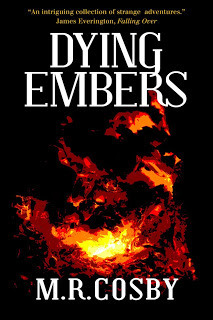
The final story listing is likely to be as follows:
The Next Terrace
Playing Tag
Unit 6
The Source of the Lea
Necessary Procedure
Abraham's Bosom
In Transit
Building Bridges
La Tarasque
Fingerprinting
Plus, something about my influences and references (some of the stories are based on local legend, others are, to a degree, autobiographical).
I'm not sure about the running order.
Wish me luck in sorting it all out for (hopefully) October 25th!
I have also created a website (www.martincosby.com) which features Dying Embers and contains more details.
By the way, I have also updated the cover design.

The final story listing is likely to be as follows:
The Next Terrace
Playing Tag
Unit 6
The Source of the Lea
Necessary Procedure
Abraham's Bosom
In Transit
Building Bridges
La Tarasque
Fingerprinting
Plus, something about my influences and references (some of the stories are based on local legend, others are, to a degree, autobiographical).
I'm not sure about the running order.
Wish me luck in sorting it all out for (hopefully) October 25th!
Published on September 15, 2013 00:22
August 30, 2013
Seamus Heany and Refugee Blues
I was saddened to hear of Seamus Heaney's death, so I thought I'd post one of my favourite of his poems, Had I not been awake. It is the first in his collection, Human Chain, first published in 2010.
Had I not been awake
By Seamus Heaney
Had I not been awake I would have missed it,
A wind that rose and whirled until the roof
Pattered with quick leaves off the sycamore
.
And got me up, the whole of me a-patter,
Alive and ticking like an electric fence:
Had I not been awake I would have missed it
.
It came and went too unexpectedly
And almost it seemed dangerously,
Hurtling like an animal at the house,
.
A courier blast that there and then
Lapsed ordinary. But not ever
Afterwards. And not now.
RIP Seamus Heaney.
I was reading my copy of Selected Poems by WH Auden recently, and came across one I had not read for many years; Refugee Blues. It struck me that it is just as relevant now as it was when it was written; March 1939. Read it and weep for the plight of displaced persons in the face of the modern political landscape.
Refugee Blues
By WH Auden
Say this city has ten million souls,
Some are living in mansions, some are living in holes:
Yet there's no place for us, my dear, yet there's no place for us.
Once we had a country and we thought it fair,
Look in the atlas and you'll find it there:
We cannot go there now, my dear, we cannot go there now.
In the village churchyard there grows an old yew,
Every spring it blossoms anew:
Old passports can't do that, my dear, old passports can't do that.
The consul banged the table and said,
"If you've got no passport you're officially dead":
But we are still alive, my dear, but we are still alive.
Went to a committee; they offered me a chair;
Asked me politely to return next year:
But where shall we go to-day, my dear, but where shall we go to-day?
Came to a public meeting; the speaker got up and said;
"If we let them in, they will steal our daily bread":
He was talking of you and me, my dear, he was talking of you and me.
Thought I heard the thunder rumbling in the sky;
It was Hitler over Europe, saying, "They must die":
O we were in his mind, my dear, O we were in his mind.
Saw a poodle in a jacket fastened with a pin,
Saw a door opened and a cat let in:
But they weren't German Jews, my dear, but they weren't German Jews.
Went down the harbour and stood upon the quay,
Saw the fish swimming as if they were free:
Only ten feet away, my dear, only ten feet away.
Walked through a wood, saw the birds in the trees;
They had no politicians and sang at their ease:
They weren't the human race, my dear, they weren't the human race.
Dreamed I saw a building with a thousand floors,
A thousand windows and a thousand doors:
Not one of them was ours, my dear, not one of them was ours.
Stood on a great plain in the falling snow;
Ten thousand soldiers marched to and fro:
Looking for you and me, my dear, looking for you and me.
Had I not been awake
By Seamus Heaney
Had I not been awake I would have missed it,
A wind that rose and whirled until the roof
Pattered with quick leaves off the sycamore
.
And got me up, the whole of me a-patter,
Alive and ticking like an electric fence:
Had I not been awake I would have missed it
.
It came and went too unexpectedly
And almost it seemed dangerously,
Hurtling like an animal at the house,
.
A courier blast that there and then
Lapsed ordinary. But not ever
Afterwards. And not now.
RIP Seamus Heaney.
I was reading my copy of Selected Poems by WH Auden recently, and came across one I had not read for many years; Refugee Blues. It struck me that it is just as relevant now as it was when it was written; March 1939. Read it and weep for the plight of displaced persons in the face of the modern political landscape.
Refugee Blues
By WH Auden
Say this city has ten million souls,
Some are living in mansions, some are living in holes:
Yet there's no place for us, my dear, yet there's no place for us.
Once we had a country and we thought it fair,
Look in the atlas and you'll find it there:
We cannot go there now, my dear, we cannot go there now.
In the village churchyard there grows an old yew,
Every spring it blossoms anew:
Old passports can't do that, my dear, old passports can't do that.
The consul banged the table and said,
"If you've got no passport you're officially dead":
But we are still alive, my dear, but we are still alive.
Went to a committee; they offered me a chair;
Asked me politely to return next year:
But where shall we go to-day, my dear, but where shall we go to-day?
Came to a public meeting; the speaker got up and said;
"If we let them in, they will steal our daily bread":
He was talking of you and me, my dear, he was talking of you and me.
Thought I heard the thunder rumbling in the sky;
It was Hitler over Europe, saying, "They must die":
O we were in his mind, my dear, O we were in his mind.
Saw a poodle in a jacket fastened with a pin,
Saw a door opened and a cat let in:
But they weren't German Jews, my dear, but they weren't German Jews.
Went down the harbour and stood upon the quay,
Saw the fish swimming as if they were free:
Only ten feet away, my dear, only ten feet away.
Walked through a wood, saw the birds in the trees;
They had no politicians and sang at their ease:
They weren't the human race, my dear, they weren't the human race.
Dreamed I saw a building with a thousand floors,
A thousand windows and a thousand doors:
Not one of them was ours, my dear, not one of them was ours.
Stood on a great plain in the falling snow;
Ten thousand soldiers marched to and fro:
Looking for you and me, my dear, looking for you and me.
Published on August 30, 2013 05:09
August 26, 2013
Review; Black Horse and Other Strange Stories by Jason A. Wyckoff
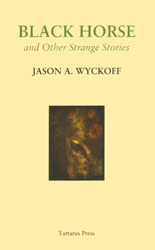
This is Jason A. Wyckoff's very first collection, and was published in 2012 by Tartarus Press. The opening story is The Highwall Horror, which I had read previously on the Tartarus website, and I very much enjoyed. It took me some time to get around to reading the rest of the book; and, I must admit, at the back of my mind, I doubted the other tales would be quite as much to my taste as was the opener. In this assumption I was, happily, mistaken.
It would be unusual to bear witness to a new writer arriving fully-formed (as far as I know, Wyckoff was unpublished prior to this Tartarus Press publication), but I could find very little to fault about this highly polished collection. Perhaps his writing style is a little stiff and wordy, leading to a sense of distance from his characters; but this links well to the traditional 'supernatural' fiction he is clearly influenced by. This formal approach is appropriate and works well, particularly for 'strange' stories, for which disbelief must occasionally be suspended.
The Highwall Horror is a small but perfectly-formed modern-day parable of alienation in the face of a mundane existence. Joe, an architect, moves into a new work space, and soon becomes obsessed by the tiny insects which seem to have invaded his cubicle wall. He glimpses a terrifying alien world, and withdraws, horrified, just as you or I would; there is, quite rightly, no room for heroics in Wyckoff's world view, and I am all the more comfortable with it for that. Just enough is left unsaid for this to be a tale which the reader will reflect upon for a long time.
Panorama confronts the reader with a fantastic artwork which would appear to exist on several different levels, and through which the missing artist may (or may not) be trying to ensnare the unsuspecting viewer. Reminding me a little of Ravissante by Robert Aickman, it is a truly unsettling tale which successfully blurs the line between fantasy and reality, and bears Wyckoff's style very distinctly. Intermediary, by contrast, is a more traditional prospect, involving archaeologists and cursed booty, yet still manages to play with reality and to stymie the reader's expectations. This collection gels immediately and is quickly into its stride; the only stumble arrives in the form of A Civil Complaint, which handles its fantasy rather clumsily.
A mother's flight from an unhappy marriage and her apparently flawed perception of events combine to create The Mauve Blot, an outstanding haunted house story with a psychological slant. Black Horse follows, which I found to be a little unbalanced; effectively building tension and interest, yet having a rather predictable conclusion.
Raising the Serpent takes us to "the back of beyond", on this occasion meaning not the outer edge of the immense West Midlands conurbation, but the grounds of a school somewhere in the depths of eastern Kentucky. Bradley Thurman is a social worker (and a "city boy", perhaps out of his depth), summoned to deal with the aftermath of a cult-style massacre in a church. His relationship with the biblically-named Zedekiah changes swiftly during their interview, and Bradley's fears about the situation escalate and are proved more than justified. The power of the Satanists and exactly what it is they want, and the doubt about Bradley's complicity, combine powerfully on the way to a compellingly ambiguous ending, and one of the best stories in the collection. Next up is The Trucker's Story, which begins like a fairly conventional tale being told over a drink in a truck stop, but develops into something more than that, involving a kind of timeslip situation. It's one of those stories I feel I should be able to grasp, but it remains just out of reach; delightfully unresolved. However, I could not quite fathom A Willow Cat in Meadowlark, in which Samantha Perridot is a teacher who is wrongly told that her mother has died. Despite the obvious mistake, she makes the long drive to view the body, and finds herself looking around the deceased woman's house. She feels the woman's presence there, and sees something inexplicable under the kitchen table in an alcove; is the house haunted? This story was a little too disjointed to work well. I enjoyed the tone and atmosphere, being reminded somewhat of the dislocation of l'Etranger by Camus, but something did not ring true; I was not convinced the protagonist would behave in the way she did.
More conventional, Hair and Nails is as close as this collection comes to a 'normal' horror story, complete with gore, and involving exhumation, re-animation and magick. This dark tale is leavened expertly with humour, and manages a good degree of suspense too. This is followed by Knott's Letter; a missive written to a certain Mr Benner, with the news of his son Kirk's demise in the Adirondack Mountains. Kirk was studying cryptozoology, and searching for the legendary Sasquatch. This letter is written by Tim Knott, a close friend of Kirk's, who accompanied him on their apparently successful search, and who hopes to impress upon Mr Benner the importance of their deceased son's work. To what degree is the letter a product of Tim's imagination? We may never know. Knott's Letter is remarkably taut and well-crafted, and would be a highlight in any collection of supernatural tales.
An Uneven Hand is a brief and effective tale of alienation in the big city. The protagonist feels powerless to intervene when he witnesses a socially dysfunctional family, and somehow finds himself taking up the reins himself – to his horror. Finally, A Matter of Mirrors is the perfect note to end on; the reader is left with good reason to avoid any of those worryingly reflective surfaces ... "Be seeing you", indeed!
Black Horse and Other Strange Stories is one of the most satisfying collections I have read recently, and shows that without doubt Jason A. Wyckoff is a great new talent. His tales both entertain and mystify, while treading strange new ground; I'm sure he will scale even greater heights in the years to come.
Published on August 26, 2013 22:01



